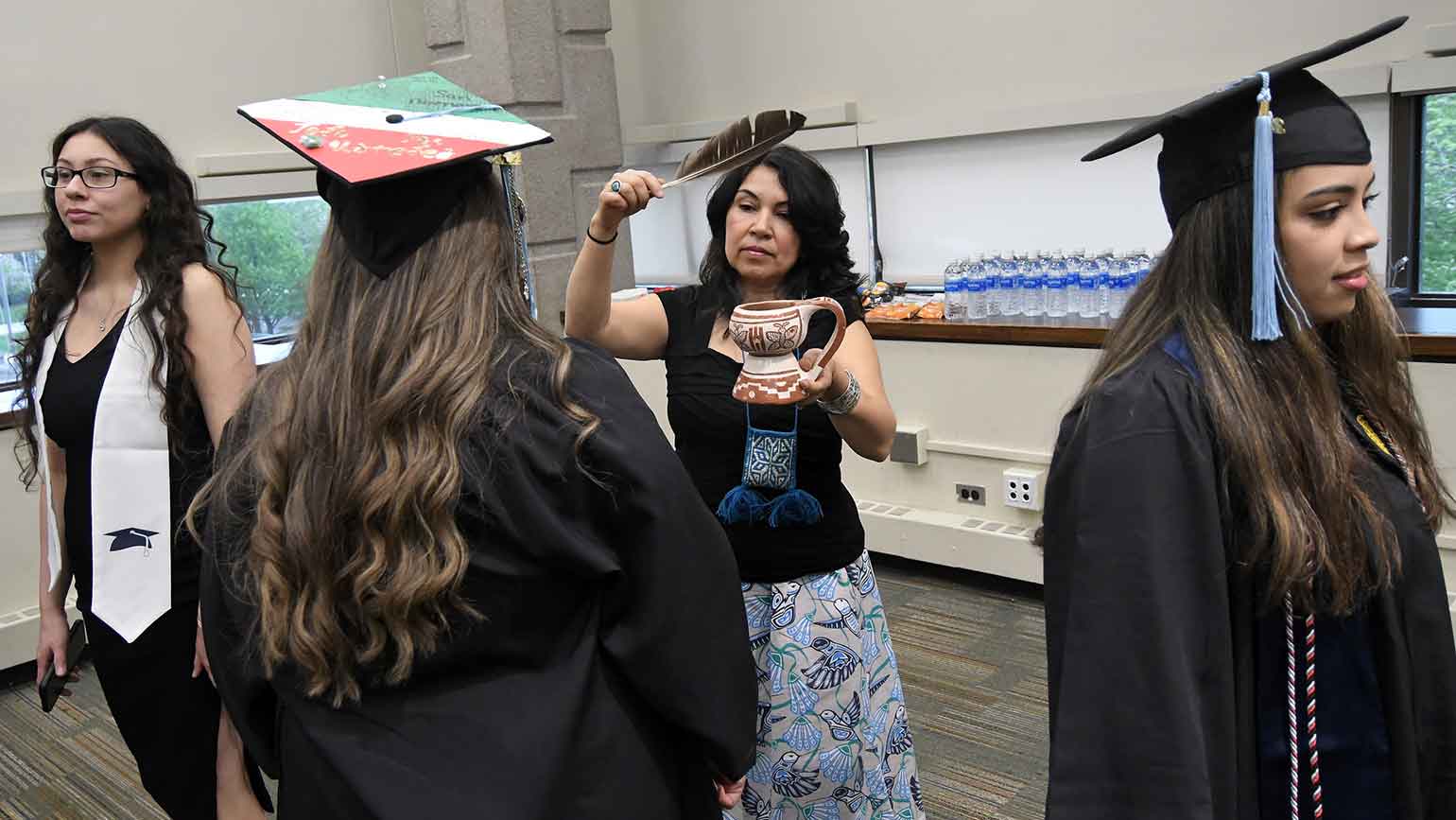
Wayne State University proudly joins the United States Congress and the State of Michigan in recognizing November as Native American Heritage Month. In tribute and celebration through campus events and the issuance of a proclamation, the university acknowledges its Native American, Alaskan Native and affiliated Island communities and the culture, traditions, languages, stories and vast contributions they have brought to our nation.
Wayne State is a proud home for diverse communities, including Native Americans. As part of a broader national movement to include Indigenous studies in higher education, the university has offerings that focus on Native American heritage and programs designed to educate the community about Native histories, cultures and contemporary issues.
“As the home to more than 440 students over the past six years who identify as American Indian or Alaskan Native, Wayne State is proud of our continued representation and celebration of Indigenous peoples,” said Provost and Senior Vice President for Academic Affairs Laurie Lauzon Clabo, Ph.D. “That pride extends to our faculty, who are leaders of programs such as the Native Development Network Learning Community (NDN LC) and Native American Student Organization (NASO).
Our Native American faculty have been pivotal in fostering community and cultural awareness on campus, establishing them as welcoming spaces that inspire engagement, belonging and success. The organizations they champion provide support for our Native community members through cultural events focused on Indigenous practices and celebrations.”
Native American Heritage Month was established in 1990.
“The history of Native American heritage in Detroit, and at Wayne State, is characterized by resilience and adaptation,” said Sandra Gonzales, Ed.D., associate professor of bilingual and bicultural education in the College of Education. “Indigenous peoples play a vital role in the city and university’s cultural landscape, preserving their identities and traditions while contributing to the broader community.”
At Wayne State, this looks like the university’s NDN LC, whose leadership was instrumental in bringing Indigenous People’s Day to the city of Detroit, and whose commitment has brought traditional ceremonies to the campus community — such as the annual Peace and Dignity Ceremony, “Pow wow in the D” — as well as cultural events like the Fall Round Dance and activities for Native American Heritage Month.
“In working with campus administrators, NDN LC and NASO have inspired policy changes to allow for the smudging of students, faculty, staff and elders within campus buildings and the re-evaluation of the campus tobacco policy to include a statement regarding the ceremonial use of tobacco,” added Gonzales. “Engagement with the Wayne State Student Senate and Academic Senate approved the university’s land acknowledgement.
“In the classroom and beyond, the scholarly contributions of our Native faculty and allies cannot be understated. From the College of Education, Law School and School of Social Work to the College of Liberal Arts and Sciences and the School of Medicine, our community has inspired a better future for all.”
Detroit is a land that was inhabited by various Native American tribes — Anishinaabe (Ojibwe, Odawa, and Potawatomi), who were part of the larger Great Lakes tribes — and Wayne State acknowledges the traditional territories of its Native people. The formal land acknowledgement is as follows:
“Wayne State University rests on Waawiyaataanon, also referred to as Detroit, the ancestral and contemporary homeland of the Three Fires Confederacy. These sovereign lands were granted by the Ojibwe, Odawa, Potawatomi, and Wyandot nations, I 1807, through the Treaty of Detroit. Wayne State University affirms Indigenous sovereignty and honors all tribes with a connection to Detroit. With our Native neighbors, WSU can advance educational equity and promote a better future for the earth and all people.”
The university continues to strive to expand upon its Indigenous education and community engagement options. This includes ongoing efforts to broaden course offerings, improve support for Native students and strengthen ties with Indigenous communities.
“The university’s recognition of November as Native American Heritage Month gives me hope that Native Americans will be more visible and recognized as current, modern and living peoples with a present culture,” said Alexis Estes, president of NASO and graduate student in the College of Education. “At WSU, we have a space of support and comraderies for Native American students and allies, a space where they can flourish as they pursue their higher educational goals.”
By Katheryn Kutil
